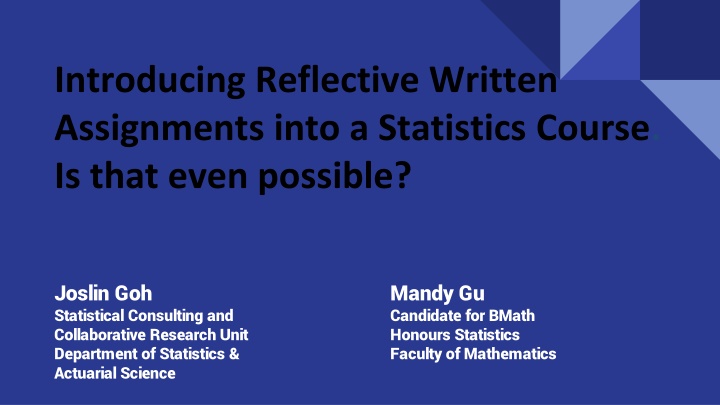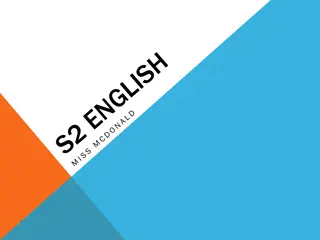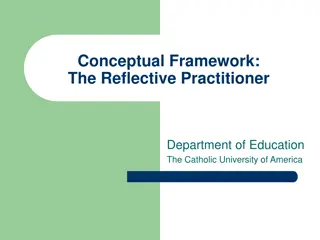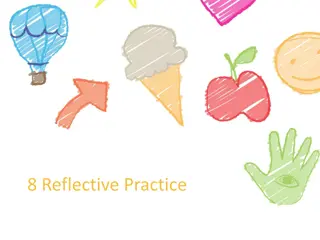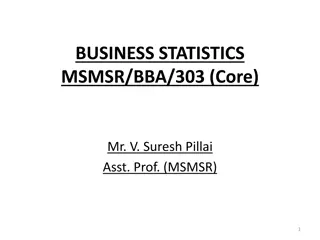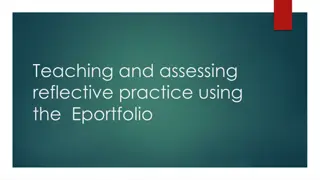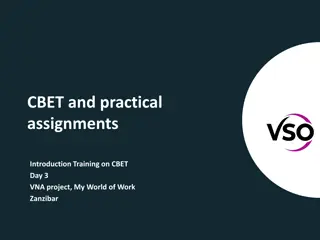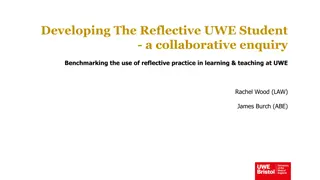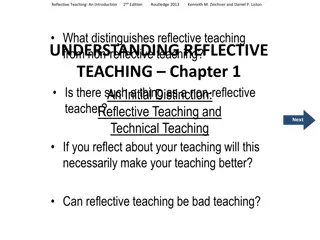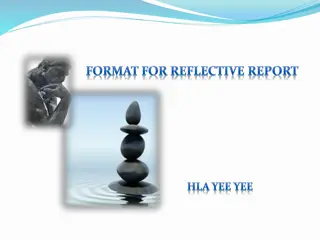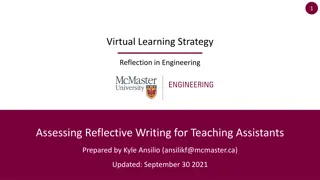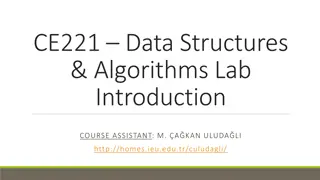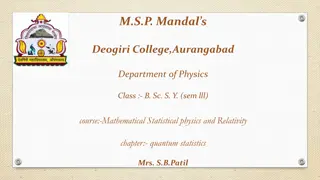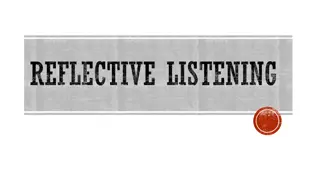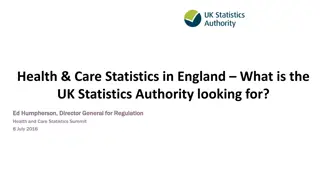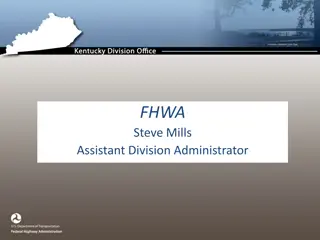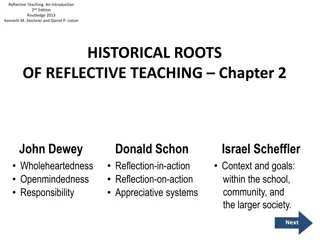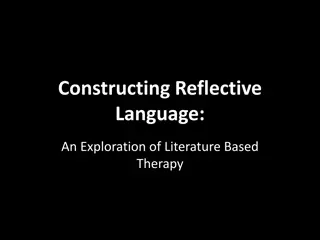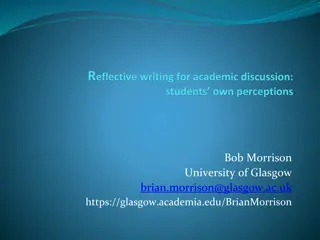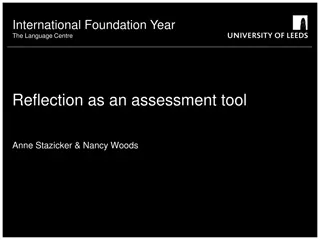Reflective Written Assignments in Statistics Courses
Introducing reflective written assignments in a statistics course can be beneficial for students, as shown by research on the impact of guided reflections. By incorporating reflective tasks alongside traditional assessments, students can enhance their transferable skills and improve their ability to articulate these skills post-course completion. This approach offers a unique way to engage with statistical concepts and promote deeper learning outcomes.
Download Presentation

Please find below an Image/Link to download the presentation.
The content on the website is provided AS IS for your information and personal use only. It may not be sold, licensed, or shared on other websites without obtaining consent from the author.If you encounter any issues during the download, it is possible that the publisher has removed the file from their server.
You are allowed to download the files provided on this website for personal or commercial use, subject to the condition that they are used lawfully. All files are the property of their respective owners.
The content on the website is provided AS IS for your information and personal use only. It may not be sold, licensed, or shared on other websites without obtaining consent from the author.
E N D
Presentation Transcript
Introducing Reflective Written Assignments into a Statistics Course. Is that even possible? Joslin Goh Statistical Consulting and Collaborative Research Unit Department of Statistics & Actuarial Science Mandy Gu Candidate for BMath Honours Statistics Faculty of Mathematics
About Us Joslin Mandy Instructor for Stat 331: Applied Linear Models in Spring 2016 Co-op student Took Stat 331 in 3A along with 4 other courses Taught Stat 331 for the first time Incorporated reflective written assignments for the first time Took Stat 331 since it is required for major Heard it was a challenging course
About Stat 331 All Math students who have taken Stat 230 and Stat 231 can take this course Required course for students majoring in Statistics and Actuarial Science Cross-listed with SYDE 334 Offered every term: 2 sections in the Fall term 1 section in the Winter and Spring terms
Common Stat 331 Assessments Depending on instructors, assessments include: Assignments Hands-on project Midterm(s) and final exam
Reflective Written Assignments in Stat 331 Included optional reflective written assignments into the course on top of the regular workload
Why Reflection? Inspired by Dr Jill Tomasson-Goodwin and Katherine Lithgow s work in ePortfolios for Career, Reflection and Competency Integration that explored the effects of guided, graded student reflections on coursework In the study, they found that students who wrote reflections about the transferable skills could better articulate these skills to other people six months after the course finished
Student Enrolment in Co-op Program In their study, they also found that students in co-op did not appear to do better at articulating their professional skills.
Upper Year Students Similarly, there is no statistical evidence that upper year students (third and fourth year) perform better.
My Implementation All three reflective written assignments were made optional Students chose to write about any of the professional skills that they demonstrated while completing their courseworks (assignments, midterms and group projects) There is a minor restriction which I will discuss later Students submitted their work in Word or PDF formats through the dropbox feature on Learn
Provided generous incentives to those who complete the optional reflective written assignments Up to 2% added to the final grade A hint during final exam
What were the students thoughts? Most math students do not have a lot of writing experience since we are only required to take 1 communication course such as ENGL 109, ENGL 210E and ENGL 210F Most of the people I know chose not to take any more communication courses
Instructions for the Students Students were given only the reflection package prepared by the a team of experts The package consists of: An introduction to reflection Instructions Table of professional skills with examples Template and a student model
Introduction to the Students Spent the last 15 minute in a lecture to go over the package with the students Their takeaway: Write a 500-word reflection.
Further Guidance Students were informed that the TAs would not be much help, and were encouraged to seek help from me during office hours
Feedback on Students Submission Most challenging due to lack of experience Students looked forward towards the feedback
More Feedback Discussed the common mistakes after grading the first and second assignments Shared examples of student assignments during lectures
Student Participation Although there was minimal guidance, the participation rate was higher than expected First assignment: 57% Second assignment: 68% Third assignment: 59%
What could the students write about in the first written assignment? Any professional skill
What could the students write about in the second written assignment? Any professional skill, except the one mentioned in the previous assignment
What could the students write about in the third written assignment? Each group member had to talk about a different professional skill
In order to complete these reflective written assignments, the students needed to collect evidence that they have successfully used a professional skill while completing STAT 331 coursework. How?
Providing Reflective Prompts Other than the reflective written assignments, students must complete technical assignments, and hands-on group projects.
Technical Assignments Similar to assignments from previous terms, The questions were designed to help the students understand the course materials Students were allowed to collaborate, but they had to hand in their own copy of the assignments
The example is very similar to a concept discussed in class: ??= ? + ???+ ?? Students could have demonstrated: Problem solving skill Critical thinking skill Personal initiative Communication skill
Group Project Each group consisted of 3 -5 members of their choice The project allowed students to demonstrate leadership and teamwork skills
Student Performance In general, students were unable to articulate their professional skills collect evidence to support their claims However, the students made progress with each written assignment
Progression through the Reflections First Reflection: concerned about getting the 2% Was confused about the purpose and expectations Template was complicated and not clear Completed assignment with mindset of getting a good mark Could not see how the process of reflection was a source of professional or personal development
Second Reflection With the second reflection, I took the time to reflect on my professional skills Gave me a clearer understanding of myself as a person and learner Realized I wasn t putting enough effort into Stat 331 Made connections between skills developed in Stat 331 and real world applications
Third Reflection By the third reflection, I understood the purpose and benefits of the assignments Convinced group member to work on the last bonus assignment
Overall Takeaways Learned how to develop and market my professional skills Developed a better understanding of my personal strengths and weaknesses, as well as how to improve my weaknesses Strength: leadership, teamwork Weaknesses: personal initiative
Student Resistance From the course evaluation, some students felt that it was unnecessary for the course as it was unrelated to the actual course materials I don't think the reflection bonus assignment is a good idea. We don't need three reflections during a statistics courses, maybe one is enough.
The Extra Benefits for Instructor Was able to understand the challenges students had in the course without conducting a mid-term evaluation Their reflective written assignments have become my reference when writing reference letters for them
Advantages of Reflection for Students After the first bonus assignment, many of my peers were doing the reflection for personal development (not just for 2%) The reflection helped me understand how I was developing professional skills through my coursework. Provided me with a different perspective on my coursework This enhanced my learning experience as I was able to see the applications of my learning
Bigger Picture of Learning Math When I was contemplating whether I should study math, I was encouraged to because: Math improves our analytical abilities Today, I know what that means.
